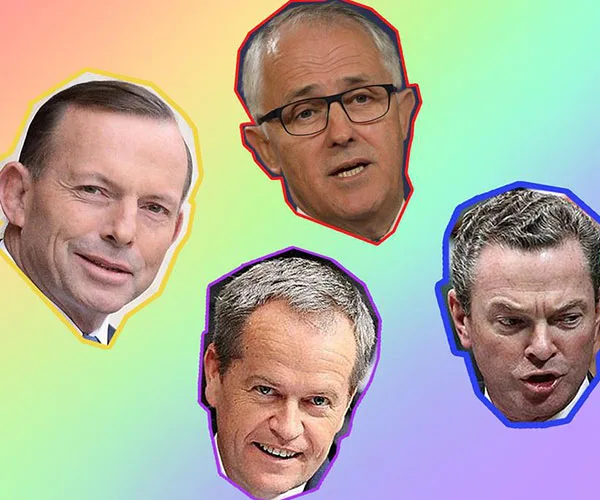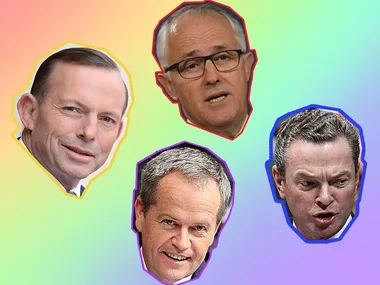With the High Court finally ruling that the postal survey is legal, voting cards are on their way to you and it’s time to get your democracy hat on.
(Well, time to submit your non-binding, non-compulsory vote to people that may or may not respect their constituents’ wishes.)

Since John Howard quietly amended the Marriage Act in 2004 to explicitly ban same-sex marriages without a plebiscite or any consultation with the Australian public, there has been 22 bills introduced into the federal Parliament.
Four of those have come to vote, only one of which to the House of Representatives in 2012. Obviously, none of those were successful in making it to the second chamber to be debated.
Some politicians have been vocal in their support or condemnation of the change to “traditional” marriage values but who’s voting which way? And have they always felt how they do now about marriage equality?
^ It’s almost like we don’t need to spend another $122 million on another survey…
Malcolm Turnbull – Yes
The prime minister has repeatedly said that both he and his wife Lucy will be voting yes in the postal survey.
He has, however, been notably reserved over the issue, restricting his campaigning to a mere affirmation. He could still be smarting from the last time he actively lead the charge for big change with the republic referendum. Despite seeming impossible to lose, Tony Abbott and John Howard’s ferocious campaign to remain under the British monarchy came out on top – could he be hesitant to put his image on the line again?
Despite voting no in the 2012 amendment, the PM has appeared to always been quite supportive of homosexuality in Australia. Back in 1978, when Abbott and Turnbull were at university, Turnbull wrote in the school newspaper:
“[Abbott] personifies the political problems of the Democrats. While he can win support from students because of the shocking state of affairs in AUS, he cannot take the next step and take control himself because of his conservative moral views. Abbott is opposed to any legalisation of homosexuality… the students may be more conservative than they were a few years ago, but they have not swung back to the right as much as that.”
- Sourced from BuzzFeed.
Bill Shorten – Yes
The Labor leader has actively denounced the plebiscite and subsequent postal survey, saying he holds Malcolm Turnbull responsible for “every hurtful bit of filth this debate will unleash”.
He voted yes in the 2012 Marriage Amendment Bill and was the first leader of a political party to introduce a House of Representatives bill to allow same-sex marriage.
However, in the final days of the 2013 election, the opposition leader said he was “completely relaxed about having some form of plebiscite” on marriage equality.
“But in terms of a plebiscite — I would rather the people of Australia could make their view clear on this than leaving this issue to 150 people.”
Richard Di Natale – Yes
The Greens leader has been an active campaigner to legalise same-sex marriage for a long time, condemning previous party leaders Julia Gillard and Tony Abbott for “impos[ing] their views on the entire Australian community”.
He said the Greens would ensure “that one way or another, by hook or by crook, we have marriage equality by the end of the year”.
Tony Abbott – No
Despite his City of Sydney councillor sister Christine Forster being gay, the former PM is staunchly in the ‘no’ camp.
In his arguments, Abbott has positioned the concept of same-sex marriage as an attack on Australian culture as we know it.
“Obviously I’ll be voting no – but in the end this is not about the politicians, it’s about the people. It’s about your view,” he said.
“And I say to you, if you don’t like same-sex marriage, vote no. If you’re worried about religious freedom, and freedom of speech, vote no. If you don’t like political correctness, vote no – because voting no will help to stop political correctness in its tracks.”
This isn’t the first time Abbott’s personal religious beliefs have affected his policies. In 2004, the then-health minister banned a morning after pill against his party’s wishes, leading to him being stripped of his authority over the issue.
Tanya Plibersek – Yes
The deputy leader of the opposition is a staunch supporter of marriage equality. She voted yes in 2012 as well, and introduced a private members bill in 2014 to put pressure on then-Prime Minister Tony Abbott to give Government MPs a conscience vote.
“Marriage equality’s time has well and truly come,” Ms Plibersek said in a statement at the time.
Barnaby Joyce – Undecided
According to the constitution, the accidental New Zealander shouldn’t even be in Parliament, but since he hasn’t been forced out – in fact, he was acting prime minister the other day – he’ll have his say in the postal vote.
Joyce has repeatedly expressed his disdain for the amount of airtime the marriage equality debate is given, dismissing it as a niche issue..
He told campaigners from both sides to “get out of his face”, saying he personally opposes same-sex marriage, but if the majority of Australians vote yes, he will not vote against it.
Penny Wong – Yes
As a lesbian frontbencher, the Leader of the Opposition in the Senate has become somewhat of the face for the ‘yes’ politicians.
She’s given multiple moving speeches about the rights of the LGBTIQ community and their children and has expressed how hard it’s been working under a government who, before Julia Gillard, refused to engage in the debate.
She’s also lashed out at the Australian Christian Lobby who “described our children as ‘the stolen generation’”.
“We love our children, and I object – as does every person who cares about children and as do all those same-sex couples in this country who have kids – to being told that our children are a ‘stolen generation’,” she said.
Christopher Pyne – Yes
Despite voting no in the 2012 amendment, the Defence Industry Minister became the subject of a media storm earlier this year when leaked tapes caught him boasting that the Coalition was working to have same-sex marriage introduced “sooner than everyone thinks”.
“I’m in favour of marriage equality, I always have been, that’s not remarkable,” he said in response to the backlash of his comments.
“I’ve said for many years that I want marriage equality in Australia. I’ve campaigned for it.”
Rebel Liberal backbenchers – Yes
Liberal backbenchers Dean Smith, Tim Wilson, Trent Zimmerman, Trevor Evans, and Warren Entsch pushed for a free vote on same-sex marriage in a hope to prevent the postal plebiscite – almost, guys.
Despite being gay, Smith actually opposed same-sex marriage until a few years ago.
Fellow backbencher Trent Zimmerman told Sky News: “There is some frustration on my part and I think of others as well that there is some who argue we should stick with the plebiscite, but then in same breath say they wouldn’t vote for marriage equality if that is what the plebiscite delivered.
“There is some inconsistency in that argument.”
Tim Wilson has tried to deflect from the debate, redirecting interview questions to other Liberal policies, but has said: “I also have a personal conflict which torments, frankly, and challenges me on a daily basis and I’d like to see this issue resolved.”
Jacquie Lambie – Undecided
The Tasmanian senator was a staunch supporter of the plebiscite, but condemned the postal survey as unrepresentative and a “failure”.
Lambie has said she opposes same-sex marriage in Australia for religious reasons. However, she said her vote will be determined by her electorate.
With so many politicians already firmly decided which way they’ll be voting when the issue makes its way to Parliament, the whole survey thing seems somewhat farcical.
That’s Australian politics for you.



